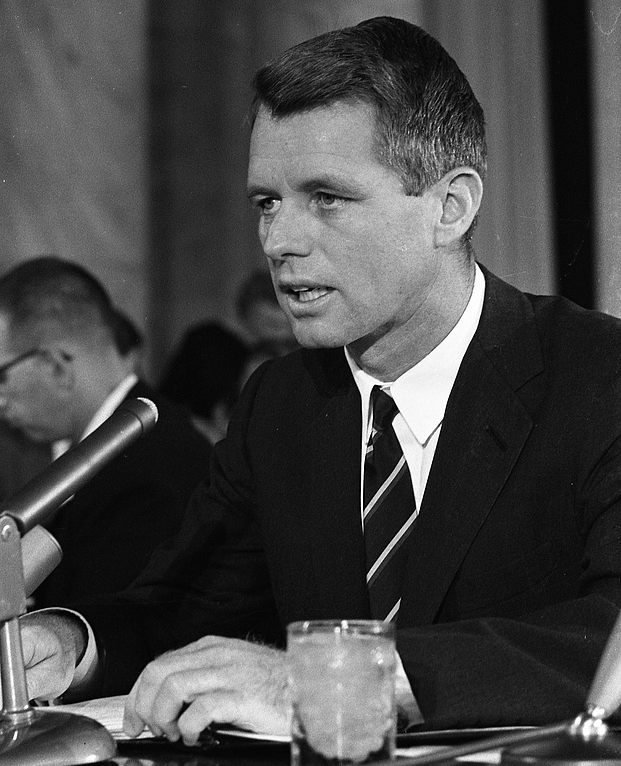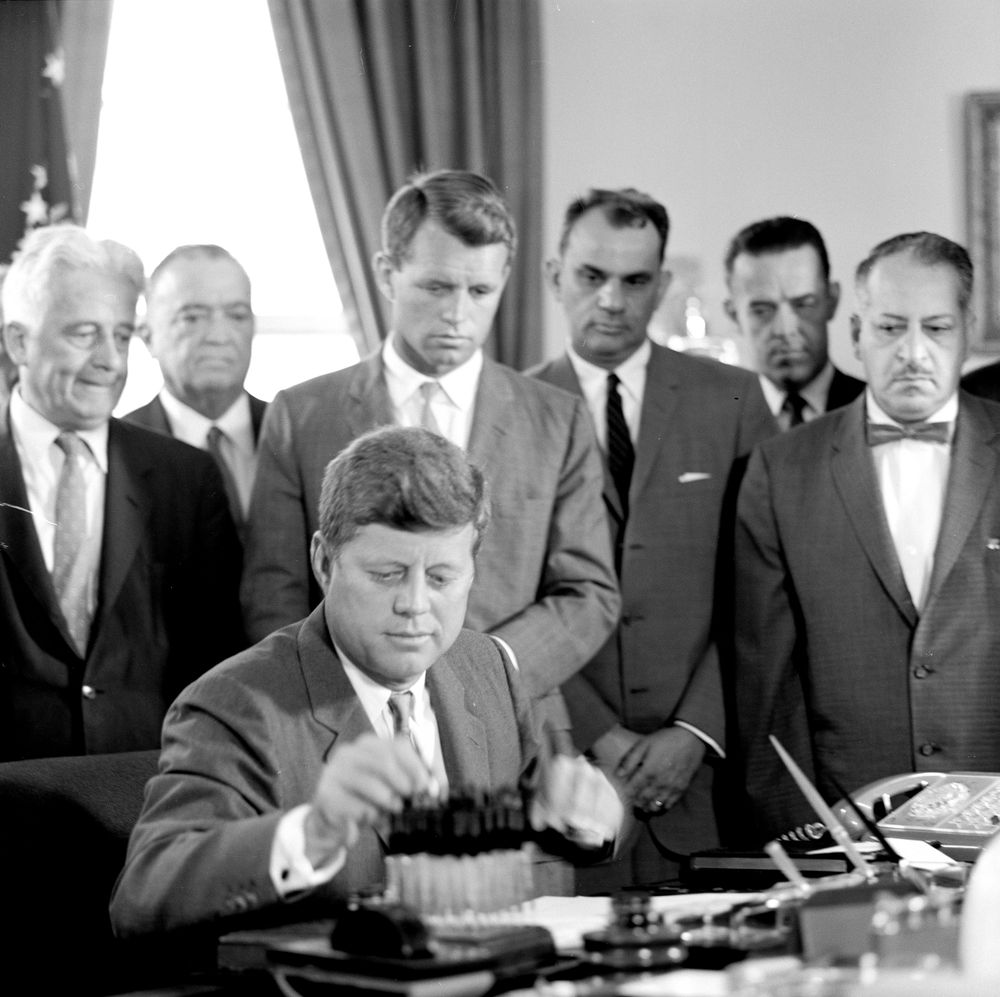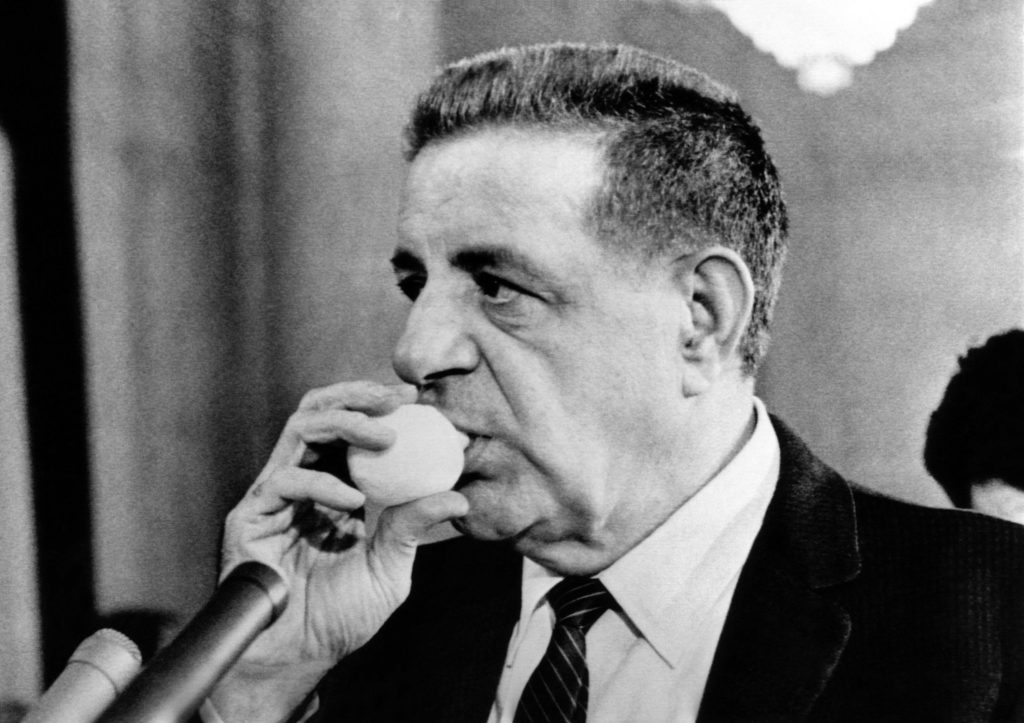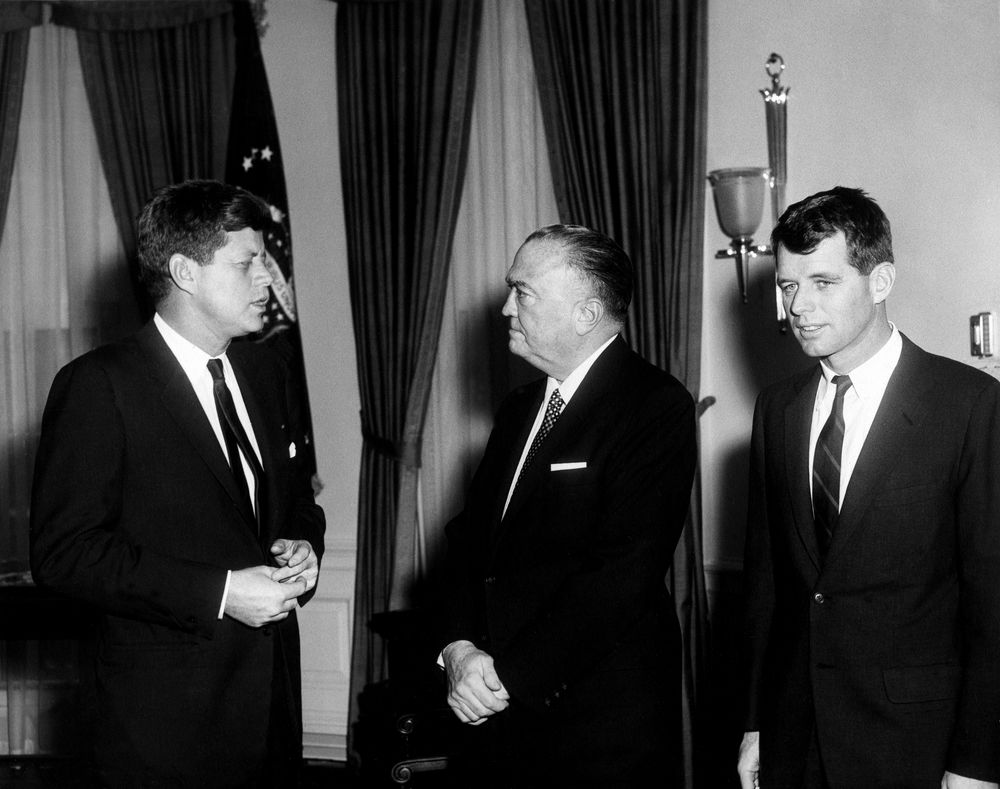ROBERT F. KENNEDY’S CRUSADE AGAINST THE MOB: PART 3
As U.S. attorney general, RFK left a lasting legacy by making organized crime a top priority

LAST OF THREE PARTS
In the days following his brother Jack’s election to the presidency in November 1960, Robert F. Kennedy wasn’t expecting to become attorney general. Nor was he President-elect Jack Kennedy’s first choice for the position. On November 10, 1960, JFK brought together his top advisers for a planning meeting at the home Bobby owned in Cape Cod, Massachusetts. Jack offered the A.G. spot to Connecticut Governor Abraham Ribicoff and then to former Illinois Governor Adlai Stevenson, who both turned him down. Then Kennedy family patriarch Joe Kennedy entered the picture, as he often did, and argued the case for Bobby, who told his father why he did not want it. To Bobby, it would have the appearance of nepotism. RFK also didn’t much like the concept of “the Kennedy brothers” that people were talking about. Besides, he said that after his work exposing labor racketeering in unions while chief counsel for the Senate Rackets Committee, “I had been chasing bad men for three years and I didn’t want to spend the rest of my life doing that.”

RFK preferred a high-level spot in the Defense Department, looking after government spending. But Defense secretary nominee Robert McNamara felt uncomfortable having to supervise the president’s brother. JFK soon warmed to the idea of his trustworthy brother, and closest aide, in the A.G job. He expressed his interest in appointing Bobby, who gave in. Both knew there’d be disapproval and political blowback. Jack joked that he would make the announcement this way: “I’ll open the front door of the Georgetown house (JFK owned) some morning about 2 a.m., look up and down the street, and, if there’s no one there, I’ll whisper. ‘It’s Bobby.’” Later, Jack again tried to make light of his controversial family appointment, saying he wanted to give his brother “a little legal experience before he goes out to practice law.” But in March 1961, in Look magazine, the new chief executive took a more serious tone in defending Bobby, whom he regarded as incorruptible.
“They tried to make a federal case out of the fact that Bobby had no courtroom experience,” JFK said. “The basic requirement for the job is not that at all. It is the ability to administer a great department. In planning, getting the right people to work and seeing that the job is done, he is the best man in the United States.”
This past week marked the 50th anniversary of the assassination of Robert Kennedy in Los Angeles. He was shot and mortally wounded on June 5, 1968, and died the following day. This is the last of a three-part series of articles on RFK, focusing on his unprecedented crusade to expose and prosecute the Mob in America from the late ’50s to the mid-’60s. It was a time when the national syndicate stood at the height of its power and influence over business, entertainment, unions, illegal gambling, prostitution, politics, the courts and all levels of government and law enforcement. Robert Kennedy played a huge role in exposing underworld activities across the country, and later prosecuting hundreds of racketeers.
Broad authority
The office of attorney general — head of the Justice Department — afforded RFK with broad authority to battle organized crime in a way never seen on the federal level. His other major priority, and what he is more recognized for today, was enforcing federal civil rights laws, and advancing new ones, for America’s black population, which, in the early 1960s, suffered through segregation, discrimination in housing and business and the denial of voting rights in some states. RFK also expressed concerns about juvenile delinquency, price fixing by businesses, an overall decay of morals in American society and a decline in the public’s trust in law enforcement.
Coverage in newspapers of the time revealed much anticipation for Robert Kennedy’s declared crackdown on crime syndicates. In December 1960, the Wall Street Journal stated that his plan was “the most sweeping campaign against gangsters, labor racketeers and vice overlords that the country has ever seen.” The editors of The Index-Journal in Greenwood, South Carolina, wrote that month that “Robert Kennedy, as attorney general, has the energy, the ability and the backing to take on this task.”
Much was also made by pundits and editorial writers about RFK’s 1960 bestselling book, The Enemy Within, which addressed his years investigating organized crime with the Senate Rackets Committee. The book included this ominous remark: “If we do not on a national scale attack organized criminals with weapons and techniques as effective as their own, they will destroy us.”
In his first formal press briefing as attorney general, in Washington in February 1961, more than 170 reporters showed up, which the Associated Press judged as “tops for a Justice Department conference.” RFK spoke about juvenile crime and business ethics. He called on Congress to pass eight proposed laws against organized crime and a bill to prohibit the interstate shipment of firearms to anyone indicted or convicted of a violent crime.
Campaign begins
That April, as part of Kennedy’s anti-racketeering campaign, IRS Commissioner Mortimer Caplin announced a plan to hire 180 new tax agents to examine records of syndicate figures and gamblers. In May, Bobby announced his first drive to root out racketeers in Chicago with a special prosecutions unit assigned to bust an automobile theft ring allegedly involving suspected loan shark Leo Rugendorf, Mob triggermen Felix “Milwaukee Phil” Alderisio and Sam Battaglia, and Joseph “Joe Pig” Pignatello, a courier for Mob underboss Sam Giancana. The Chicago Tribune reported that the effort would be backed by a “mobile force” of 50 Justice Department lawyers based in Washington. That June, RFK’s office gained indictments on 13 national organized figures in a countrywide horse race betting scheme, and launched his first major raid, using IRS agents to arrest six alleged illegal gamblers. In December 1961, IRS criminal agents, as part of RFK’s crackdown, performed simultaneous raids in 22 states, arresting 128 people in 100 betting parlors suspected of not paying gambling taxes. His continued national onslaught against the syndicate would be referred to as “Operation Big Squeeze.”
RFK that year led the Kennedy administration’s push to pass its eight anti-crime bills, some of them similar to what his predecessor, Attorney General William Rogers, had wanted. On July 28, 1961, Bobby watched from the visitor gallery as the Senate passed four of the bills. One would give up to five years in prison and $5,000 fines to racketeers and others convicted of obstructing legal investigations by the Justice and Treasury departments. Another would make it a felony to transport betting slips and other illegal gambling paraphernalia across state lines. Still another would permit witnesses in labor racketeering cases to obtain immunity from prosecution. Six of the eight bills passed that year, one of them the most famous of the Kennedy-era anti-racketeering laws — the Federal Interstate Wire Act, prohibiting the transmission of information on bets and wagers for sporting events over state lines, aimed squarely at syndicate bookmakers. President Kennedy signed it into law on September 13, 1961.
At a news conference in Chicago a month later, RFK said that in the few weeks since the Wire Act became law, some major sports gambling information wire services had shut down completely, including Nola News of New Orleans and Athletic Publications in Minneapolis.
Among his wins in 1961 was the prosecution of infamous Los Angeles bookmaking king Mickey Cohen, convicted of felony tax evasion, and convictions of mobsters or Mob associates Frankie Carbo, Frank “Blinky” Palermo, John Battaglia, Isadore Blumenfield, John J. Felice, Nicholas Sitrone, Felix Ferina, Anthony Cardella, Anthony Biase, Benjamin Dranow and Abe Minker. RFK’s department also indicted three police officials, an attorney and the operator of an illegal gambling operation in Newport, Kentucky. His office late that year also won 11 convictions in the famed “French Connection” international heroin-smuggling case in New York.
By 1962, RFK pointed as accomplishments the passage of the anti-crime bills and his creation of an intelligence unit in the Justice Department’s criminal division. Congress granted him the $1.1 million budget he requested to investigate the syndicate, more than double what his office received in 1961. His office by early 1962 was looking into 700 mobsters and their associates. Still, in May, RFK made it clear that it wasn’t time to celebrate yet. “Have another look at the situation in five or so years,” he said. “Then you can say whether or not we are succeeding.”
The next year, 1963, would start off with the news Bobby reported to the president in January about the progress against organized crime since 1960. The administration’s anti-crime laws allowed the FBI to follow more than 850 new criminal cases involving the Mob, and federal grand juries had indicted more than 130 defendants, raising the number of suspected hoods indicted to 350 in 1962, compared with 49 in 1960.
In March 1963, during a national tour of Justice Department field offices engaged with his organized crime clampdown, RFK told reporters in Chicago that his next objective would be corrupt public officials who aided and abetted criminals. He announced that the syndicate still operated in major U.S. cities, including Chicago, Detroit, St. Louis, Kansas City and New York, but was largely absent in Los Angeles and the West Coast thanks to effective local law enforcement.
Valachi hearings
The most explosive development in organized crime was the 1963 testimony before Congress of Joseph Valachi, a longtime middle-level New York mobster caught up in coin-operated jukeboxes and other rackets and who had attended the Apalachin Summit in 1957. While in federal prison, and afraid about being killed by the Mob figures, Valachi agreed to testify before the Senate Investigations Subcommittee, chaired by Bobby’s old boss on the Rackets Committee, Senator John McClellan. Valachi, bearing witness candidly on live national TV, offered inside stories about the national syndicate — referred to as La Cosa Nostra — about Sicilian initiation ceremonies for “made” men and other tales going back to the underworld of the early 1930s. Valachi spoke about the doings of famous leading mobsters Giuseppe Masseria, Salvatore Maranzano, Charles “Lucky” Luciano, Al Capone, Frank Costello, Vito Genovese, Vincent Mangano and Dutch Schultz. He recounted how Mob boss Masseria was killed in 1931 after a 14-month war with Maranzano that Valachi ended with the deaths of 40 to 60 of Masseria’s men. Maranzano was killed by Luciano’s cohorts five months later. Valachi fingered Vito Genovese as the new “boss of bosses under the table” as of 1963 and as having “lots of interests” in legalized gambling in Las Vegas. At each hearing, Valachi had a crew of U.S. marshals guarding him, after a story circulated that the Mob had placed a $100,000 price on his head for singing to Congress.

Joseph Valachi sucks on a lemon during congressional testimony in 1963. Valachi revealed secrets about the history and practices of the American Mafia that were valuable to investigators and prosecutors. Everett Collection Historical/Alamy Stock Photo.
Robert Kennedy intended to use Valachi’s riveting testimony, in hearings from June to October 1963, as an argument to Congress to pass new anti-Mob legislation. He wanted laws allowing him to tap the phones of the subjects of his investigations and grant witnesses immunity from prosecution as long as they did not cite their Fifth Amendment rights against self-incrimination.
After President Kennedy was assassinated that November, RFK, following his initial shock and recovery from his grief weeks later, stayed on as attorney general under President Johnson and restarted his organized crime cases. But this time, Hoover went over his head and met directly with Johnson, who liked Hoover and would appoint him for life in 1965. When Bobby resigned from the A.G.’s office in September 1964, Hoover reverted to neglecting organized crime as he once had. William C. Sullivan, at one time the third-highest official in the FBI, wrote in his 1979 book, The Bureau: My Thirty Years in Hoover’s FBI, that when RFK left, “the whole Mafia effort slacked off again” within the agency until after Hoover died in 1972.
Bobby’s old nemesis, Teamsters Union president James Hoffa, stood up on a chair in a Miami restaurant and cheered after hearing of JFK’s assassination. Hoffa phoned his lawyer and said, “Have you heard the good news? They killed the son a bitch. This means Bobby is out as attorney general. Lyndon will get rid of him.” But in March 1964, with RFK still in office, Hoffa, who attempted to bribe jurors in a federal kickback case filed by RFK’s Justice Department in 1962, was convicted of jury tampering, a felony. A judge sentenced Hoffa to eight years in federal prison. It was first time in five federal trials that Hoffa received a conviction.
RFK remained as Johnson’s attorney general for only six more months, till September 1964, five years since he had resigned from the Rackets Committee. He would then seek, and win, the seat as junior U.S. senator from New York that November. As for organized crime, that obsession for him while a senator seemed to fall by the wayside in favor of other national issues important to him, namely poverty and civil rights.
But RFK had in only a few short years produced lasting results in his campaign of stepped-up enforcement against organized crime, from intelligence gathering to indictments and convictions. By the time he left as A.G., his office had indicted 687 organized crime figures. Its conviction rate reached nearly 90 percent. His targets included New Orleans crime boss Carlos Marcello, Chicago Outfit second-in-command Sam Giancana, Joseph Bonanno’s crime family in New York, Raymond Patriarca’s Mafia family in Rhode Island and the DeCavalcante crime group of New Jersey. Giancana’s brother Chuck would write that to Sam’s surprise since the 1960 election, “Bobby Kennedy, now ensconced as the attorney general, was orchestrating what would become the largest attack on organized crime in the nation’s history.”
RFK, through determination, public statements, hearings and the backing of his powerful brother, produced a tectonic shift in the awareness of the populace, Congress and the FBI that organized crime existed as an illegal economy and source of corruption throughout the country. His stewardship most certainly led to future legal strategies and methods – such as RICO, the Racketeer Influenced and Corrupt Organizations Act, passed by Congress in 1970 – that FBI and Justice employed to severely damage La Cosa Nostra from the 1970s to the present day. A half century is a long time. But RFK’s legacy in American law enforcement against organized crime, though controversial, is truly extraordinary and deserves recognition.
RFK in his own words
In 1964, in the months after President Kennedy’s assassination, RFK agreed to some long interviews with journalists. In December 1964, three months after resigning as attorney general a month following his election as U.S. senator from New York, he spoke at length with Anthony Lewis, Pulitzer Prize-winning columnist for The New York Times.
RFK recalled that once in office as attorney general in January 1961, he set in motion a hiring spree. He recruited many new lawyers and investigators for the department’s Organized Crime Section. He included a special group, the Labor Rackets Unit, better known as the “Get Hoffa Squad,” created in the main to develop criminal cases against the racketeer-connected Teamsters Union president James Hoffa. FBI Director J. Edgar Hoover, who for many years denied that organized crime even existed, approved, at RFK’s insistence, moving the FBI toward probing organized crime and increasing its staff for that purpose.
(W)hen I became attorney general, I proceeded on the basis that there was such a thing as organized crime. And they (the FBI) started investigating it. … And they went to work on it. They had 10 people (in New York’s FBI office) before 1960; and by 1962 and ’63, they had 140 people. That was the second biggest unit after Communists and Espionage.
And then out in Chicago they had six men; and by the time I left (as attorney general), I think they had 60 or 80 men working there. They just put a great number of people on it all over the country. They started to work on it, and they started to get informants. I asked them to go into it like they went into the Communist Party…
So by the end of 1962 they reached the conclusion there was organized crime in the United States and that there was a Commission made up of about a dozen people across the country who ran it. Then they were able to break it down into exactly how it operated: who were the heads of the families, and what they controlled, and who controlled them, and what kinds of orders and instructions they took. They were able to put together – with what (mobster turned informant Joe) Valachi said, plus other informants, plus people they had within — how the Cosa Nostra worked.
Kennedy told Lewis that after the 1960 election and before he was sworn in as attorney general, the Treasury Department’s legal counsel informed him that IRS criminal agents could not be used to investigate the crime syndicates. So Kennedy met with Douglas Dillion – JFK’s choice as Treasury secretary — and Hoover before January 1961. He mentioned that “this was something I knew President Kennedy was interested in,” and the three decided to have Treasury and its IRS criminal agents join other federal investigations into organized crime. RFK would, for the first time, convince 26 federal agencies – including the FBI, Treasury, Secret Service, Bureau of Narcotics and Postal Service – to cooperate and share information on organized crime.
Another thing he did soon after his swearing in as attorney general was to meet personally with Hoover at the Justice Department. RFK recalled that the director, finally, appeared amenable to placing more attention on the national syndicate.

I said, ‘This is what we’re going to concentrate on; this is what we’re going to do.’ He agreed to do it…. There was a unit in the Department of Justice which wasn’t very active or very effective in organized crime. We reorganized that, with the understanding that these other people would become actively involved in it – the other agencies. And that’s what happened. I met with all the investigative representatives of these other agencies. They brought them in from all over the country, and I discussed our program with them and what we wanted done.
Some officials in Treasury and the IRS remained opposed to the idea for about the first six months of the Kennedy administration. Treasury was afraid they would collect less delinquent tax money and embarrass the agency when it reported to Congress, RFK told Lewis.
As it turned out they’ve collected more money making these investigations than they would have otherwise. So not only has it paid off in convictions and in intelligence information, but it’s paid off financially. And they’ve done a helluva good job at the Treasury Department. The FBI was reluctant to get into it. In the first place, they never shared information with any other investigative agency; and I said if we were going to all work together, they had to give the information to the other investigative agencies.
It only worked, he said, because of his special relationship as brother of President Kennedy.
If they could have gone over my head to the president, I couldn’t have gotten the Treasury Department to do it. I couldn’t have gotten them to reverse their position, because a lot of them in the hierarchy were opposed to it. They hated the idea. And of course J. Edgar Hoover didn’t want to get in.
RFK said he understood Hoover’s uneasiness about RFK’s role because of “the idea that I was coming in and making changes of the things that had existed for a long period of time.” So he had a special phone installed in his office to reach Hoover directly and arranged for JFK to meet with Hoover for lunch every two or three months.
In his conversations, Hoover, RFK said, “had some good ideas about reorganizing some of the departments” such the CIA.
He talks a hellava lot – J. Edgar Hoover – but I think that the president always felt they were worthwhile. … The relationship we had was not difficult. I mean, it wasn’t an impossible relationship.
President Kennedy, in his second term, surely would have replaced Hoover with someone else, although he might have extended Hoover’s 1965 scheduled retirement date for a time, RFK said.
Hoover, Bobby said, “didn’t like me much” because of the major changes he and JFK made in the FBI to tackle organized crime and civil rights in the early 1960s.
For the first time since he had been director of the FBI, he had to take instructions or orders from the attorney general of the United States — and couldn’t go over his head. … Therefore, he couldn’t like it. Why would he like it? He hadn’t made any changes himself for 20 years …
“I made an effort with him which was in my interest and in the interest of government,” RFK added. “But after November 22, 1963 (JFK’s assassination), he no longer had to hide his feelings … and he no longer had to pay any attention to me. And it was in his interest, evidently … to have that kind of a relationship and arrangement” with President Johnson.
When Johnson became president, he said, Hoover “would never deal directly with me or through me” and instead, in public announcements, would claim Johnson had requested the FBI to do things.
But Bobby decided to stay in office anyway for nearly 10 months after the assassination.
I thought that if you’re going to be in charge of the Department of Justice, you should be in proper charge of the Department of Justice. But that if I got out of there (after JFK died) under those circumstances – during that difficult period of time between the two of us – it would be considered that I was getting out for a different reason. That wouldn’t do any good. I was going to accept that relationship through the year — and then I would get out. But I thought that was a mistake. I thought that it was an intolerable situation for any other attorney general. And I hoped that he (Johnson) would. Well, he always said that he would. Or that that wasn’t, really, the situation that exists – that J. Edgar Hoover never came to him directly (bypassing Bobby). But that wasn’t the truth.
RFK could point to many tangible achievements during his tenure as attorney general. Several months before leaving the Justice Department in 1964, he boasted that by early 1964, convictions related to organized crime had increased by 700 percent from 1960, and indictments of alleged hoodlums by 700 to 800 percent. He had won over the FBI on the issue, and built procedures that brought 26 federal agencies together, sharing information on future cases.
Had his brother lived, it is almost certain that Bobby Kennedy would have persisted against organized crime. Had RFK himself not been killed in 1968, and won the presidency, he would have known how to proceed and likely would have made even more progress. His assassination in June 1968 altered the course of American history in so many ways.
But while many other nations of the world still struggle to rid their societies of home-grown organized crime, in the United States today, the once-powerful La Cosa Nostra is in tatters. It is far less significant and by no means the ingrained national syndicate it was before Robert Kennedy entered the national stage, at a young age, and left it 50 years ago.
Feedback or questions? Email blog@themobmuseum.org





